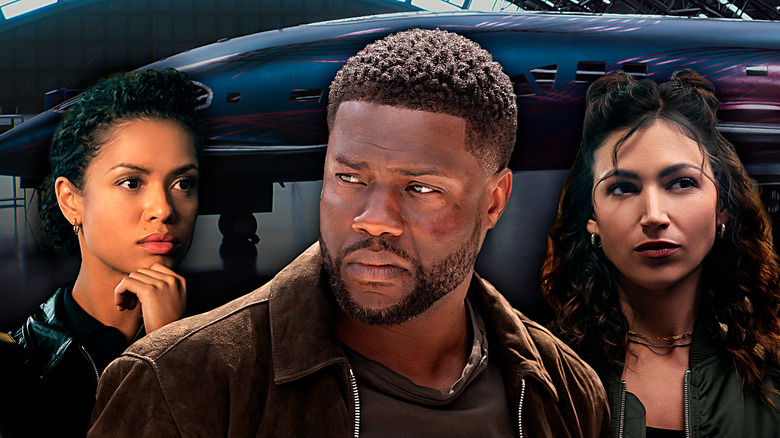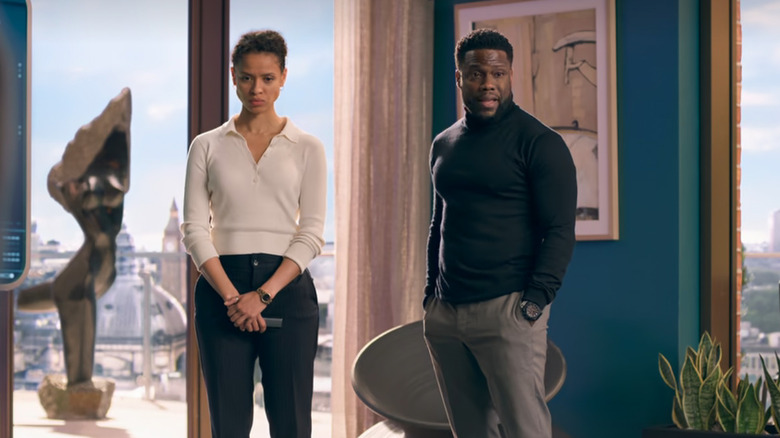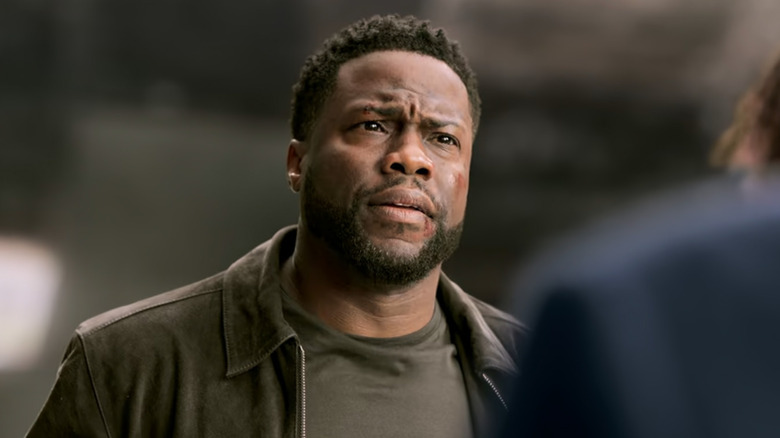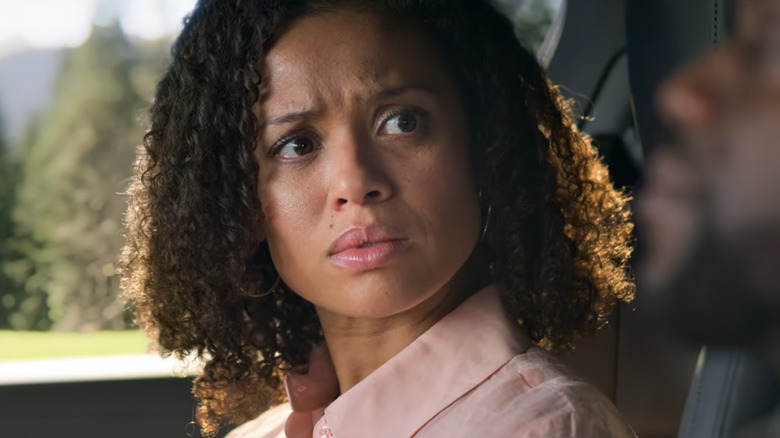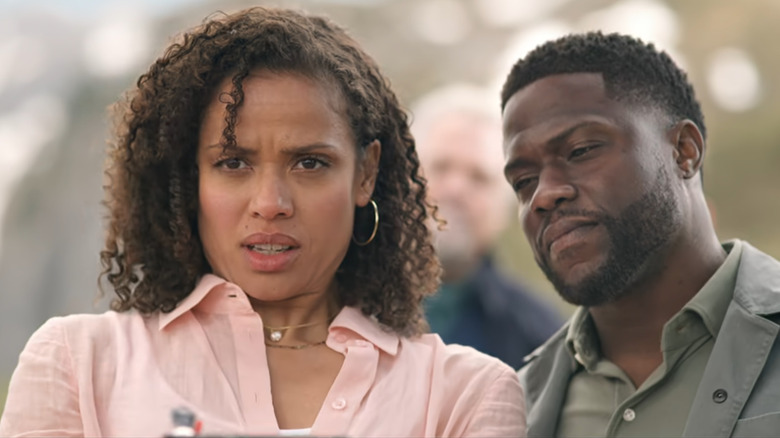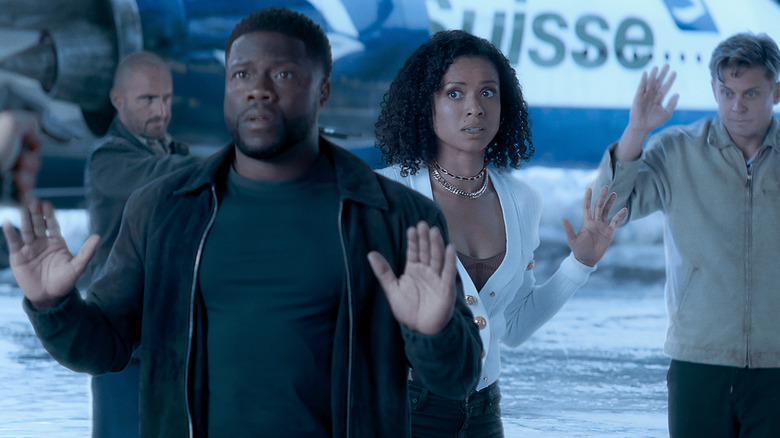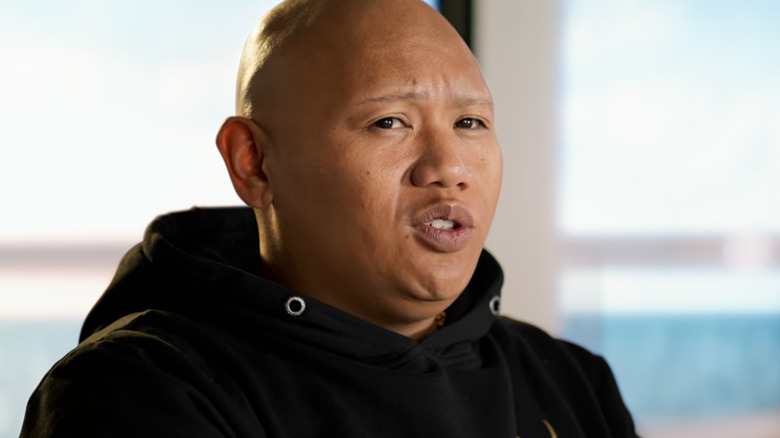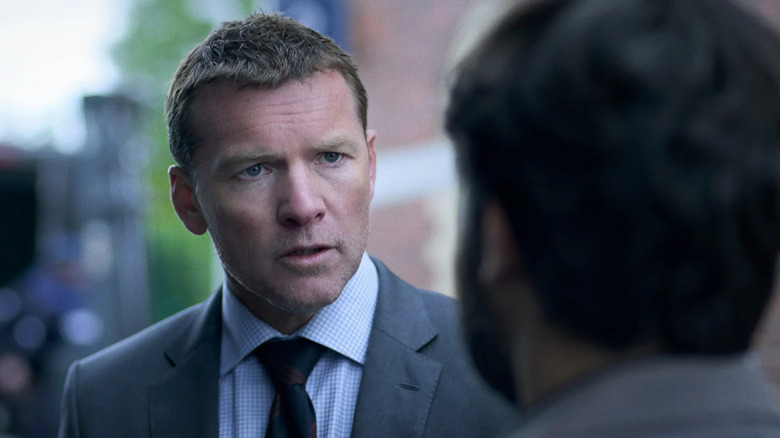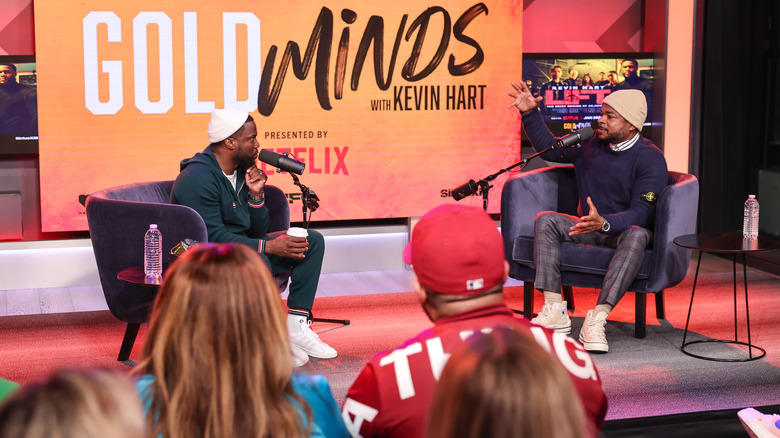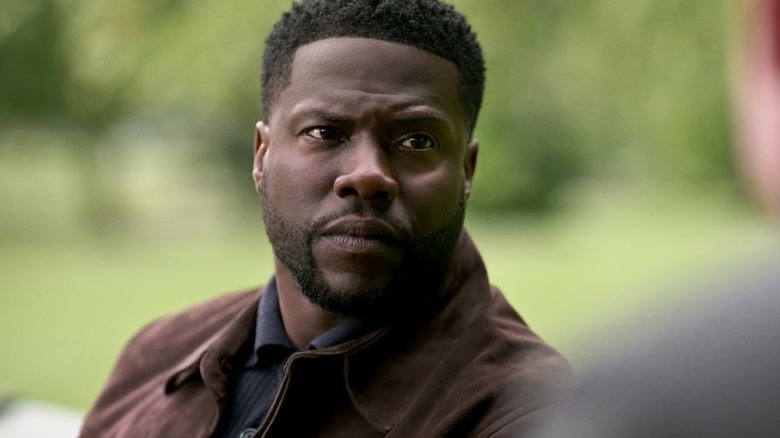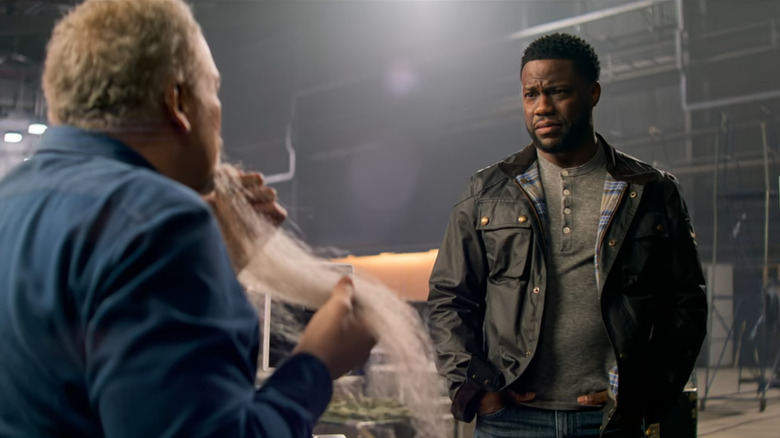The Ending Of Netflix's Lift Explained
Contains spoilers for "Lift"
The Netflix original movie "Lift" stars Kevin Hart as a do-gooding art thief named Cyrus who is brought in by the authorities — but not to do time for his crimes. Instead, he's enlisted by Interpol agent Abby Gladwell (Gugu Mbatha-Raw) to intercept the delivery of $500 million in gold bars before it can be handed off to a dangerous terrorist.
"Lift" is a modern heist flick in the vein of classics like Edward Norton's "The Italian Job" or George Clooney's "Ocean's 11," but Kevin Hart's film isn't a remake. It's an original story, and with director F. Gary Gray (who also helmed "The Italian Job"), it's a first-rate one with riveting action and death-defying stunts. But as is common with most heist films, the plot isn't so simple, with twists and turns and plenty of surprises — as well as a lot of characters to keep track of.
By the end of the movie, your head may be spinning from all the intense thrills, and a lot is going on that may need some explaining. From undercover plots to secret agendas, we've got it all covered: This is the ending of "Lift" explained.
What you need to remember about the plot of Lift
As "Lift" begins, Cyrus and his crew have stolen a valuable Van Gogh painting and fenced it to pay for the legitimate purchase of a one-of-a-kind NFT by a mysterious artist known as N8 (Jake Batalon). Interpol agent Gladwell, meanwhile, has them dead to rights on the theft, but her boss Huxley (Sam Worthington) forces her to make them a deal: Help them stop the transfer of $500 million in gold bars from war profiteer Lars Jorgensen (Jean Reno) to a deadly terrorist known as Leviathan.
To accomplish the mission, however, Cyrus and his team must borrow a jet from an eccentric billionaire (Oli Green), customize it into a stealth aircraft, and get it close enough to their target to be able to swap their radar signatures. Then, they'll have their man inside air traffic control divert the flight to another location. This way they can make the 'lift' while a drone completes the flight to Zurich so as not to alert Jorgensen.
But Cyrus and his crew must also board the flight themselves, break into a secure vault in mid-air while avoiding a gang of ruthless henchmen, and transfer it to their own plane, all without Jorgensen ever finding out who they are. They hit their first snag when their engineer Luke bails on the mission, forcing them to improvise. But their attempt to get the plane diverted gets them noticed, and Jorgensen's men move the gold to the stealth jet, ordering Cyrus and his team to Zurich at gunpoint.
What happened at the end of Lift?
Unfortunately for Cyrus and Agent Gladwell, getting caught red-handed by Jorgensen's men is actually the least of their worries. When Interpol boss Huxley gets wind that things have gone sideways, he orders NATO to shoot them all down to prevent Leviathan from getting their hands on the gold and potentially causing millions of deaths in a diabolical terrorist attack. Thanks to some quick thinking, though, pilot Camila (Úrsula Corberó) is able to alert NATO that there are civilians onboard, forcing them to call off the attack.
After a fierce firefight in the cabin, the jet crash lands at Jorgensen's villa, where he's meeting with Leviathan's representative (Martina Avogadri) to take custody of the gold. But when Leviathan's rep learns that they've been caught in a scheme led by an Interpol agent, she backs out of the deal and Jorgensen murders her in cold blood. When authorities arrive, it's a case of he-said-she-said as Jorgensen tells them to arrest the intruders, until Cyrus pulls his last card.
Using the video feed from the swanky jet's external cameras, he plays a clip of Jorgensen murdering the Leviathan leader. His fate sealed, Jordenson is arrested just as Huxley arrives on the scene, and with the job done, Cyrus and his men leave with full immunity for their past crimes.
A happy ending for Cyrus and Gladwell?
For all the action, suspense, and excitement in "Lift," the heart of the drama revolves around Cyrus and Gladwell, who have a complicated history. We learn early in the film that Gladwell was once on an undercover assignment when she met and fell in love with Cyrus — who didn't tell her that he was an art thief — and the pair spent a week together in a whirlwind romance. But their reunion for the mission to stop Jorgensen isn't a happy one for Gladwell, who balks at Cyrus' attempts to woo her again, as she is still indignant that she'd fallen for a career criminal.
By the end of "Lift," though, the pair have worked out their differences, and it seems there might even be some new chemistry between them. After they take down Jorgensen, Gladwell quits her job at Interpol, furious over Huxley's order to shoot down the jet that she was aboard. In a final moment together, Cyrus tells Gladwell that he wants to be with her again, and as a token of his love, he tracks down and acquires a valuable piece of art once stolen from her mother, the headmistress of a primary school.
Weeks after the operation ends, Cyrus and Gladwell are now once more a couple and set out on a new journey together. But can an ex-Interpol agent and a professional thief really be happy together?
The ending of Lift left a twist with a twist
If you think there are no surprises left after Cyrus finishes the job and walks off into the sunset with Gladwell, think again. In the film's final scene, Cyrus makes the remarkable revelation that he had a secret plan all along: To steal the $500 million in gold bars for himself and his team. He pulls it off thanks to Luke, who never really quit the operation — dropping out of the mission was all a ruse to allow him to execute Cyrus' plan without Interpol ever knowing.
How did they pull it off? Well, safecracker Magnus (Billy Magnussen) created a duplicate set of bars out of iron and gold paint, which were loaded onto the airliner as ordinary cargo. Once the plane was readying for landing — while Jorgensen's men were engaged in a fight for control of the aircraft — Magnus swapped the real bars for the fake ones, dropping the real gold into a lake below. So what Huxley and Interpol got was little more than worthless metal, while Cyrus, Gladwell, and the team escaped without anyone being the wiser.
In the film's last shot, Gladwell presses a button on a controller that draws the crate of gold to the surface of a Swiss lake. As the two embrace in a passionate kiss, Cyrus welcomes Gladwell to the team, to which she responds simply, "Please, call me Abby."
What the ending of Lift means
"Lift" is all about a group of art thieves, but it's important to remember that they're not exactly the most nefarious criminals. They're actually more like folk heroes, and it's established early on that they don't just steal artwork for greed and thrills, with Cyrus even referring to the theft of the Van Gogh as a "rescue." According to Cyrus, they steal precious works of art from wealthy people they believe are undeserving of such greatness. One might question their sincerity to this mission statement considering the millions they often earn when fencing stolen pieces, but the ending of "Lift" hammers home that their charitable mission is for real.
Sure, the group doesn't seem overly enthused about their mission because it will save lives: They initially accept it to secure themselves freedom from Interpol. But by the end of the film, it's clear that they have more noble goals, even if they get rich along the way. After all, they could have held N8 for ransom if they'd wanted more money or bailed on the mission when Cyrus offered them an out — offering to complete the mission himself.
But when the "Lift" comes to an end, we realize that Cyrus and his team are good people with their hearts in the right place. And it's their good hearts that are likely what convinces Gladwell to join them, because their noble mission strikes a chord with her desire to see justice done.
Did Cyrus even care about immunity?
When Agent Gladwell first approaches Cyrus to recruit him for the mission on Huxley's orders, he initially wants nothing to do with it. What he really wants is Gladwell, and it's only when she informs him that Interpol has all the evidence she needs to put him and his team in jail for life that he comes around. But by the end of the movie, there's at least some suggestion that Cyrus didn't care about immunity at all, and the reason he accepted the operation was the chance to show Gladwell just what kind of man he was.
Consider Cyrus' true skills: He's an expert thief, well-versed in getting away with extraordinary crimes. He has a loyal team of highly skilled operatives that includes a hacker, an engineer, a safecracker, and a pilot. If Cyrus wanted to evade the authorities, he certainly could have. And to this point, his crew have had no problems living as fugitives — there's little incentive to take on the mission when it means crossing one of the most dangerous men on the planet.
Also consider that by the end of the film, Cyrus had successfully swindled Interpol out of $500 million, making him a fugitive once more. If he really wanted immunity, he would have carried out the job and walked away with his hands clean. But at the end of the day what he wanted was to prove to Gladwell that she'd be better off joining him.
What happened to N8?
"Lift" begins with Cyrus' purchase of an NFT created by a Banksy-like artist known only as N8. While Gladwell and Interpol worry that he and his team are attempting to 'lift' the piece, Cyrus makes a legitimate transaction, but convinces people it's nefarious to increase the NFT's value as it becomes part of a scandal. The scheme works: Cyrus uses the hubbub to flip the piece for a cool $89 million.
But what happened to N8 after Cyrus paid for his NFT? On the surface, it would seem like an idle question, as N8 doesn't factor into the rest of the film. But in his big scene, N8 learns about Cyrus and his crew — along with their life as art-collecting Robin Hoods — and he seems almost drawn to the allure of their mission. Later, when they need to secure the services of a private jet, Cyrus suggests that N8 is in his employ now, offering the jet's owner a personally commissioned NFT from him. Does this mean that N8 is somehow working with Cyrus?
While N8 isn't an official member of the team — he's not present during their subsequent heist nor when they celebrate at the end of the film — he may now be an ally that Cyrus can count on.
Unanswered questions from the ending of Lift
With a complicated scheme at its heart, "Lift" has a lot going on for viewers to keep track of. And when it comes to an end there's still quite a few loose ends and unanswered questions left to ponder. For starters, is Interpol boss Huxley is even aware that Agent Gladwell has joined Cyrus' gang of gold-hearted thieves? While we do see Huxley discovering the fake gold bars at the end of the film, there's nothing on the surface to suggest that she played any part in the lift of the real gold.
Similarly, one might wonder if Interpol even suspects that Cyrus and his crew were responsible. It's just as likely that they suspect Jorgensen himself switched out the gold to deceive Leviathan. Still, Huxley would probably suspect Cyrus, and if he does, that would likely mean rescinding their immunity offer. If that's the case, why would a by-the-books government agent like Gladwell be so eager to become a career criminal?
But the most interesting question to ask is regarding Huxley's motives. Even if Cyrus' jet was headed for Jorgensen's villa, it seems odd that he would order a NATO strike when he could just as easily order agents to intercept it on the ground and expose Jorgensen in person — which is exactly what they ended up doing. Is it possible that Huxley isn't the upstanding Interpol operative he appears to be?
What the cast of Lift has to say about the ending
More than just high-speed thrills, "Lift" boasts an impressive cast led by Kevin Hart and Gugu Mbatha-Raw, but also international stars like Korean star Kim Yoon-Ji and Spanish actor Úrsula Corberó. For the cast, the camaraderie on-set was one of the best parts of the making of the project, but during the press tour, they talked about just how incredible it was filming that climactic ending action sequence.
"We did a nice amount of rehearsal," said star Kevin Hart in a chat with Lauren Veneziani where he was interviewed alongside Mbatha-Raw and Corberó. Hart says the entire fight sequence aboard the plane was given a lot of attention by director F. Gary Gray, and it took a full week to film, which surprised Corberó, who wasn't part of the action.
"There were several different planes," Mbatha-Raw explained, "so we had different sequences, like the stealth jet and the first-class lounge." There were thankfully no injuries during filming of those sequences, though Hart was quick to add sarcastically, "I think a few stunt guys got hurt after dealing with me, but that's expected."
How F. Gary Gray and Kevin Hart celebrated the ending of Lift
Kevin Hart is more than just an actor, comedian, and Hollywood producer — he's also the host of his own podcast, "Gold Minds with Kevin Hart," on Sirius XM satellite radio. In preparation for the release of "Lift," Hart did a special episode that featured the movie's director F. Gary Gray as his guest. When Gray first took the mic, he was looking to celebrate the ending of their long journey together on the movie — and he brought a gift.
He handed Hart a small black box, and Hart opened it cautiously to discover a horde of expensive cigars. The box was gold-lined to celebrate the gold heist in the film, as Gray explained. "This is something to celebrate," the director remarked. "We did our thing, we went through it, we're done, we're finished, and I just want to share a cigar with you, bro."
Kevin agreed wholeheartedly, telling his friend and director that there was a lot to be excited about. "We're celebrating the complete process that you and I know that we embarked on." This was no ordinary movie for Hart, but his first time leading his very own action movie.
Could we see a sequel to Lift?
If there's any question you'll be asking at the end of "Lift," it's whether or not we'll get to see more adventures of Cyrus and his crew. The film's ending strongly hints that this isn't the last adventure, and there's a lot more story to be told: Abby Gladwell has joined the team, Huxley has learned he's been duped, and Cyrus is, presumably, returning to the life of an art-rescuing thief and fugitive. If a sequel does happen, it sounds like the cast wants back in.
"I would do it in a heartbeat," said Billy Magnussen (via Audacy). "It was just so fun. It was a great opportunity. As an actor, you can have the depth of character, you can have the depth of story in here, I think F. [Gary Gray], constructing the story, seeing Kevin in this whole new light, basically, it's a great look on him." But if the film is to receive a sequel, it will need more than just excitement from its cast, but a response from the audience. And while critical scores haven't been strong, Netflix will tell the tale. After all, Ryan Gosling's "The Gray Man" also received a lukewarm response, but is already moving forward with a second film — and a spin-off — making it clear that Netflix is all-in on the action franchise game.
What about an F. Gary Gray cinematic universe?
If there is a sequel to "Lift," there are many forms it could take. While the most obvious might be a second movie that sees Cyrus, Abby, and the rest of the crew engaged in another daring heist, there's been at least some idle chat about crossing the film over with another F. Gary Gray movie — the 2003 heist film, "The Italian Job" starring Edward Norton — which ironically also opened with a boat chase through the canals of Venice.
Admittedly, this is one concept that was brought forth as a hypothetical by various interviewers who recognized that one of Gray's earlier hits had a similarly themed story. But the suggestion caught on with members of the cast, including star Kevin Hart, who loved the idea. "I like the 'Italian Job' crew," he said during the press tour. "That crew early on it was before a lot of those stars are the stars that they are today, and I like that energy or synergy."
It may be a long shot — especially as the two films are owned by rival studios Netflix and Paramount — but the F. Gary Gray connection and Hollywood's current love of cinematic universes and franchise crossovers may make it too tempting to pass up.
